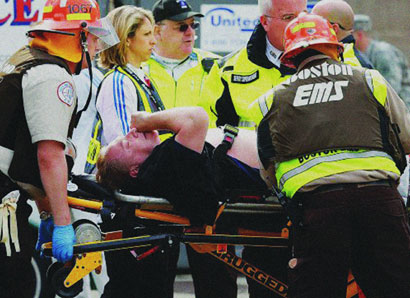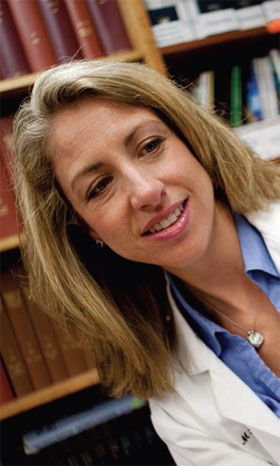
First aid: Dr. Kathryn Ackerman ’94 helps treat a victim of the Boston Marathon bombings.Provided
Kathryn Ackerman ’94 has long married athletics and medicine. A government and biology double major on the Hill, she rowed varsity crew for the Big Red and competed in the world championships on the U.S. national team; after earning an MD from Johns Hopkins, she specialized in sports medicine and endocrinology. In addition to serving as a team physician for U.S. Rowing, Ackerman is on the Harvard faculty and co-directs the female athlete program at Boston Children’s Hospital.
It’s not hard to guess where someone like Ackerman would spend Patriot’s Day. And indeed, since 2006, she has served as a medical volunteer at the Boston Marathon. Along with about a dozen others from her practice, Ackerman usually works at the finish line or about fifty yards past it, in Medical Tent A. Their cases generally run to electrolyte imbalances, fatigue, foot injuries, and hyper- or hypothermia; occasionally, they’ll see a heart attack or seizure. “The marathon is a huge tradition, and it’s exciting to support the people who are running for charity,” Ackerman says. “It’s a really happy day in Boston, typically.”
But of course, this year’s race was anything but typical—and Ackerman was on the front line. CAM spoke to her two and a half weeks after the event.
Cornell Alumni Magazine: Before this year, did you ever worry about security?
Kathryn Ackerman: Not really. One year I was taking care of a patient who had become delirious and said he wanted to kill all the doctors. He wound up leaving a bag in the medical tent, and as soon as I notified someone, bomb-sniffing dogs were brought in to check it out. I was impressed that they took a flippant comment so seriously and were all over it.
CAM: This year, when did you realize that something was wrong?
‘The fact that the bombs were put where people could mobilize so quickly was, fortunately, a mistake on the part of the bombers. I can’t tell you how surprised, proud, and impressed many of us feel that there were so few deaths—as horrendous as it is that there were any.’KA: I was in Medical Tent A and we heard this loud boom. It clearly sounded like an explosion—at that point we didn’t realize what had exploded, or where—and about ten seconds later there was another. We have a person in the tent who runs the microphone, and he announced there was an explosion at the finish line and we should get ready for casualties. I was concerned that some of them would be my colleagues, because we had four doctors, an athletic trainer, and a physician assistant from our practice working there. So I immediately ran over to see what help they needed and if they had been injured. When I got out there, all of them were already working on patients. There were people lying on the ground in disarray, and a lot of spectators were helping them. I realized they needed way more help, so I ran back to the tent and announced that we needed doctors, IVs, and transportation.
CAM: Can you describe the scene at the finish line?
KA: One thing that struck me was how everybody was chipping in. As soon as we knew what happened, that it was truly a bomb, people were not running away—they were diving in and helping. I saw tons of people mobilize and do their jobs extremely effectively and not act scared, which was vital. At one point I was attending to a couple of people in a store, Marathon Sports—the bomb had gone off right in front of it—and someone from the SWAT team came in and said, “There may be a third bomb. We need everybody out of here.” So we transferred the patients to the tent. It was remarkable how quickly and efficiently people worked.
CAM: With the police warning of more bombs, were you scared for your own safety?
KA: I naively wasn’t thinking about it. I was thinking, These people need help. We need to get this done. It didn’t even occur to me until the SWAT team warned us about a third bomb that there could even be one. I thought the situation was over, and now we needed to take care of the aftermath, get these people to the hospital, and keep them alive.
CAM: Many people compared the scene of the explosions to a war zone. Is that how it struck you?
KA: Yes, that’s exactly right. It looked like those roadside bombings they talk about on the news.
CAM: What kind of wounds did you treat?

White-coated: Ackerman in the office.KATHERINE COHEN
KA: Most of them were lower extremity injuries —limbs that were off, had shrapnel in them, were partially missing. The injured were actually pretty calm; they just wanted to be helped. There wasn’t a lot of screaming. It was a calm scene.
CAM: With your specialty in sports medicine, you don’t generally treat trauma cases. Did your med school training come flooding back?
KA: There are some basic things in terms of life support that physicians need to keep up with—so even though we’re not used to seeing so many casualties at the same time, there are some lessons that we keep in mind. And there were also a lot of hands on deck. We had six people from our practice on the finish line, and four of them were surgeons—so the surgeons were among the first ones there, which was fantastic.
CAM: Do you think that the medical infrastructure that was already in place for the race made all the difference in saving lives?
KA: Absolutely. The fact that the bombs were put where people could mobilize so quickly was, fortunately, a mistake on the part of the bombers. I can’t tell you how surprised, proud, and impressed many of us feel that there were so few deaths—as horrendous as it is that there were any. Before the names of those who had passed away were released, we thought that some of the people we’d treated might not have made it. It has helped our healing process to know that they’re alive and getting care.
CAM: Given your own proximity to the blasts, were your friends and family frantic to make sure you were all right?
KA: I hadn’t looked at my cell phone for the first forty-five minutes or so, because we were so busy. Then I saw people texting and thought, Why are they doing this? And I remembered, People know that I’m here. They’re probably concerned. I looked at my phone and I had about thirty texts asking, “Are you OK?”
CAM: Once all the trauma cases were treated, what did you do?
KA: We typically start seeing runners with serious medical problems around four-plus hours into the race—and that was right around the time that the bombs exploded. So we were wondering, What happened to those patients? Where did they go? Once we got everybody triaged and off to the hospital, we needed to clear Tent A, because the SWAT team wanted to check it for bombs. Then we went to the Boston Common, where we were directed to wait for runners and other people we could help. But by the time we got there, there was nothing organized; we weren’t sure if those runners were OK, if they’d been taken in. We stood around the Common for a while directing people, but there weren’t that many to direct. So around 5:30 we walked to Tent B, which was wrapping up, and then I biked home to Newton.
CAM: What was the mood as you rode through the city?
KA: Absolute shock. A lot of people know that their friends and family are at the marathon; it’s a huge part of Boston. So whether you’re working at the medical tent, running, or standing along the racecourse, so many people in Boston are involved that everybody was affected. People were just sort of wandering afterwards, looking upset and dazed.
CAM: In the immediate aftermath, how were you feeling?
KA: Initially I was OK. And then by Friday—when there was the lockdown, and I found out that the bombers had lived on the cross street of my old apartment in Cambridge, and that the carjacking hostage had escaped across the street from the boathouse where I row—it was getting extremely personal. I was feeling scared. Even after they caught the second bomber, some of the PTSD starting hitting all of us and we weren’t really feeling safe in the city.
CAM: Have you and other first responders been getting help in processing what you experienced?
KA: Our group at Children’s Hospital got together for a session with someone from the psychiatry department; talking with people who were there has helped. Disaster relief organizations have gotten in touch, and the marathon is sending out resources.
CAM: Does being a physician—someone who understands the nature of PTSD—make it easier to cope?
KA: I think everyone responds differently; even in our practice, of the fourteen people who were there, some have handled it completely differently than others. It hits people at different times. I was one of three attending physicians from our practice there, so I feel a need to help the younger people accept that they’re going to go through a lot of emotions, and they may not feel comfortable talking about day-to-day sports injuries and more trivial things. It’s been hard for me to hear about simple problems when I’m feeling so much empathy and horror about what the marathon victims are experiencing, and how much rehab they’re going to go through.
CAM: Has life gone back to normal in Boston?
KA: I’d say we’re getting there. People have really been supportive; I think there’s been an extra feeling of solidarity in the city. People are feeling strong—like we can’t be beaten. The marathon’s going to be even bigger and more successful, and we’re going to support the victims. The One Fund is a huge focus now.
CAM: When people witness something like the marathon bombings, they often wish they could help—and you were not only there, you had the training to save lives. What does that feel like?
KA: When I went to the memorial service, that hit me at the end, when the entire cathedral was singing “America the Beautiful” with the President. I thought, I’m really glad I had the opportunity to grow up and become a doctor and do something useful with the knowledge I gained. It was a good feeling to know that when something traumatic happened I was able to act and do the best job I could. That part has given me a lot of peace. But it wasn’t just the physicians and nurses who were helpful; the athletic trainers, the podiatrists, the massage therapists all helped. People who didn’t have medical training knew to grab wheelchairs or bring out gurneys. So I’m glad I have these skills, but I’m also proud of the people who had the presence of mind to do the right thing.
CAM: Does living through something like this change how you feel when you hear the word “terrorism”?
KA: It definitely doesn’t seem as far away. I’m much more aware of how easily it can happen anywhere in the world. I also have an incredibly increased appreciation for our military, who deal with these types of things frequently, and don’t get nearly as much media coverage.
CAM: Will you be back at the marathon next year?
KA: Definitely. I’ll either be working in the medical tent—or on a team, running to raise money for the One Fund.
Donations to aid people affected by the Boston Marathon bombings can be made at onefundboston.org.


